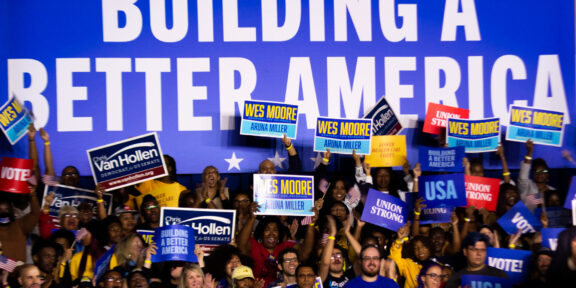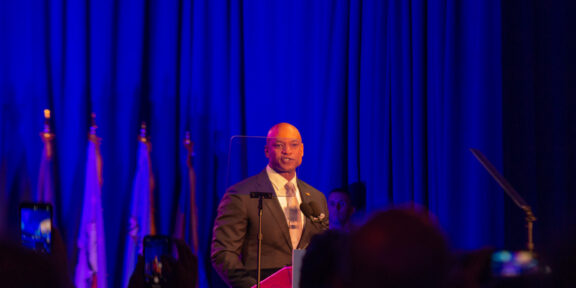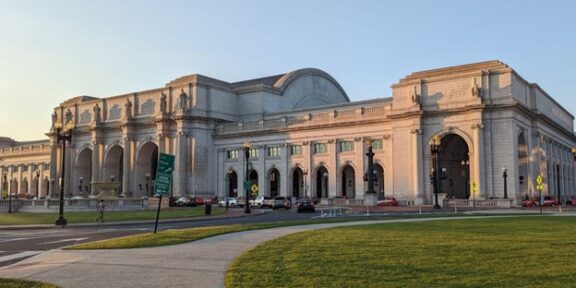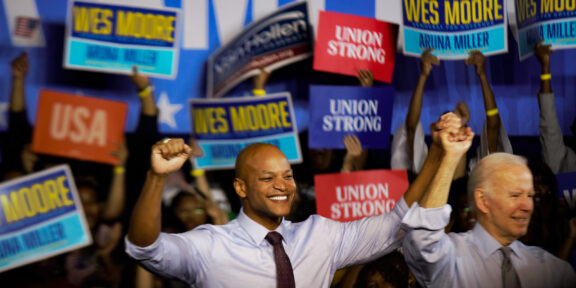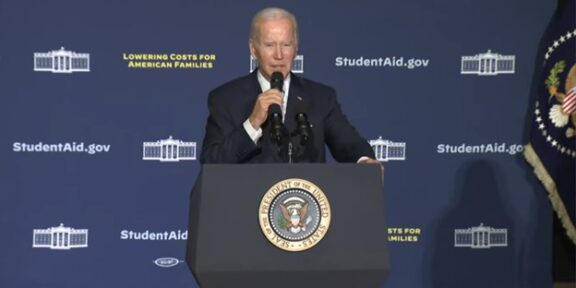By Julius Washington
Howard University News Service
Maryland Gov. Wes Moore released his administration’s first spending proposal during a press conference at noon today. The $61.2 billion budget projects a year-end surplus while also funding much of the new administration’s priorities.
Moore referred to his budget proposal as an affirmation that his administration would “be bold without being reckless.” The budget includes a $2.9 billion “rainy day fund” that makes up 10% of the state’s general fund and, if tax revenue projections hold, an expected $2.3 billion surplus.
Moore outlined much of his governing philosophy in an op-ed published by the Baltimore Sun earlier this month and followed through with many of his campaign promises in today’s budget proposal.
Moore has emphasized that he would take a responsible approach in his upcoming budget proposal and would first ensure the critical functions of government are funded before new appeals from entities across the state. He promised that his administration would be “disciplined, accountable and intentional in how we invest Marylanders’ money.”
For the first time in eight years, Democrats have unified control of the state government, and both the governor and members of the legislature have emphasized their desire to work together to achieve their shared goals.
Senate President Bill Ferguson referred to a legislative breakfast press conference as productive and “a very collaborative environment.”
Maryland’s HBCUs, which have been historically underfunded, received special attention from Moore during his campaign and priority in the governor’s budget proposal. Funding for the state’s four Historically Black Colleges and Universities has been increased by 18% above last year.
In an increased focus on education, Governor Moore’s proposal commits $500 million to the Blueprint for Maryland, a 10-year plan intended to transform education in the state, as well as a historically high amount of funding for the state’s community colleges. Moore described the funding levels as “above and beyond” the Blueprint’s requirements.
The budget also makes provisions for several of the new governor’s signature campaign promises.
Another $500 million was set aside for transportation initiatives, including the Red Line, which was canceled by Moore’s predecessor, Gov. Larry Hogan.
Notably, the administration has not yet announced a new transportation secretary, but the governor has promised to fill the seat in an expedited time frame. “We’re very close,” Moore promised during his press conference.
Included in the budget is $18 million for a new Department of Service and Civic Innovation, which would be responsible for implementing a new public service-year option for all high school graduates in the state.
During the press conference, Maryland Secretary of Budget and Management Helene Grady illustrated the challenges the state will face in raising revenue. Notably highlighted was how the state benefited in the last year from more positive-than-expected market performance in FY21 as well as disbursements of federal stimulus dollars from several pieces of COVID-19 relief legislation passed in the last two years.

Public Expectations for the Moore-Miller Administration
The excitement was palpable and the expectations were high at Gov. Wes Moore’s public inauguration ceremony at the Maryland State House.
“There’s nothing like being in real time. There’s nothing like witnessing history in real time,” said Melissa Witherspoon, a special needs teacher and master’s candidate at Howard University, mentioning the Rev. Dr. Martin Luther King’s “I Have a Dream” speech on the National Mall.
“I have a grandmother who talks about that speech, listening in real time. … You can’t discredit that.”
Tameika Pope agreed. “I don’t know that everybody understands the significance of this moment in time, because I don’t know when this is going to happen – if this is going to happen – again,” she said.
One attendee who didn’t want to be named said he skipped work to be able to say he had been a witness to the historic event.
For some Marylanders, the prospect of seeing a Black man elevated to the highest office in the state is a victory in itself, but in his inaugural remarks, Moore was careful to not dwell on becoming the only sitting Black governor in the country and the first Black governor in Maryland’s history.

William Dock, a Maryland resident who attended the inauguration, felt that Moore’s election was the culmination of increased political interest of individuals like himself over the last few years.
“Well, the last seven years, I’ve been very involved in politics, because of the political climate, but then Wes Moore really represented why you should be in politics,” Dock said. “I really do feel like he’s gonna deliver on schools and Black economic growth.”
Among the new governor’s responsibilities as chief executive will be to appoint officials to fill out cabinet positions in the executive branch and to hire employees for thousands of state government positions that were left vacant during the Hogan administration.
Moore has already announced picks for 20 cabinet members and announced the creation of two new cabinet-level positions, Special Secretary of Opioid Response and Secretary of Service and Civic Innovation, which would oversee a new public service initiative for high school graduates in the state.
Of his selections, more than half are women and nine are people of color, including Susan Lee, who will become the first Asian-American Secretary of State in Maryland history. Moore has made his intentions clear that his goal is to assemble “the most diverse cabinet in the history of Maryland.”
Last year, Gov. Larry Hogan approved a nearly $60 billion budget for the state, including a record $6.8 billion in capital funding, a record $3.2 billion Rainy Day Fund and left the incoming Governor Moore with a multi-billion dollar surplus. Moore released his first budget today, a $61.2 billion dollar proposal that addresses a number of campaign promises.
Several residents who attended the inauguration mentioned that they were supporters of both Governors Hogan and Moore, praising both men’s ability to work outside of predrawn political lines.
“They do practical thinking. They don’t let party affiliation interfere with what’s going to be needed for Maryland,” said Roosevelt Phillips, who was attending the ceremony with his wife, Pamela, also a Hogan supporter.
In his inaugural address, Moore promised to raise the state’s minimum wage to $15 an hour, put Maryland on track to create 100% of the state’s electricity through clean energy by 2035 and create a one-year public service option for high school graduates. Moore’s budget proposal includes funding for all of these initiatives.
He also dedicated part of his speech to reiterating his plans to transform public education in Maryland, an area where Dr. Lee Summerville, who served as science supervisor for both Montgomery and Howard counties, said she was looking forward to seeing what Moore would do. Other residents agreed that more funding was necessary.
“Well, he says ‘leave no one behind.’ Hopefully that means fund the schools equally. That’s a good start,” Ken Yargus, a resident of Cape St. Claire said. “And [provide] affordable community colleges.”
Another attendee of the historic inauguration, Dr. Anne Riley, said she was looking forward to Moore’s governorship because, “He’s not going to veto the environmental bills.”
On his first official day as governor, Moore released $9 million in funding for the Climate Solutions Now Act, which Hogan left unfunded.
Here’s some more of what Marylanders want to see from a Moore-Miller administration:

Dr. Nettie Baldwin, Silver Spring, Maryland
“I am very much interested in education, mental health, but I believe Moore is going to concentrate on youth. We have to form youth so we have families, strong families.”
Teresa Beall, Brandywine, Maryland
“I would really like to see the taxes go down in the state of Maryland. I would love to see that happen so I don’t have to think about moving some place like Florida.”
Pat Yargus, Cape Saint Claire, Maryland
“Maybe some housing that people can afford. You don’t want to make it too crowded, but you need more housing. It’s always a balancing act.”

Ebony Johnson, Coppin State University Alumna
“Honestly, I’m looking for him to help bring more funding to HBCUs, but also make sure that that funding is accounted for. There’s a lot of time that funding is not accounted for, making sure that money goes into student’s hands, especially disadvantaged ones.”
Pamela Phillips
“I’m expecting Governor Moore to do what he says he’s going to do, leave no Marylander behind and actually focus on Baltimore even more. It’s still a lot to be done and for somebody to actually have direct ties to Baltimore, I’m looking forward to that.”
Julius Washington is a political reporter for HUNewsService.com and covered Gov. Wes Moore during the 2022 midterm election.


